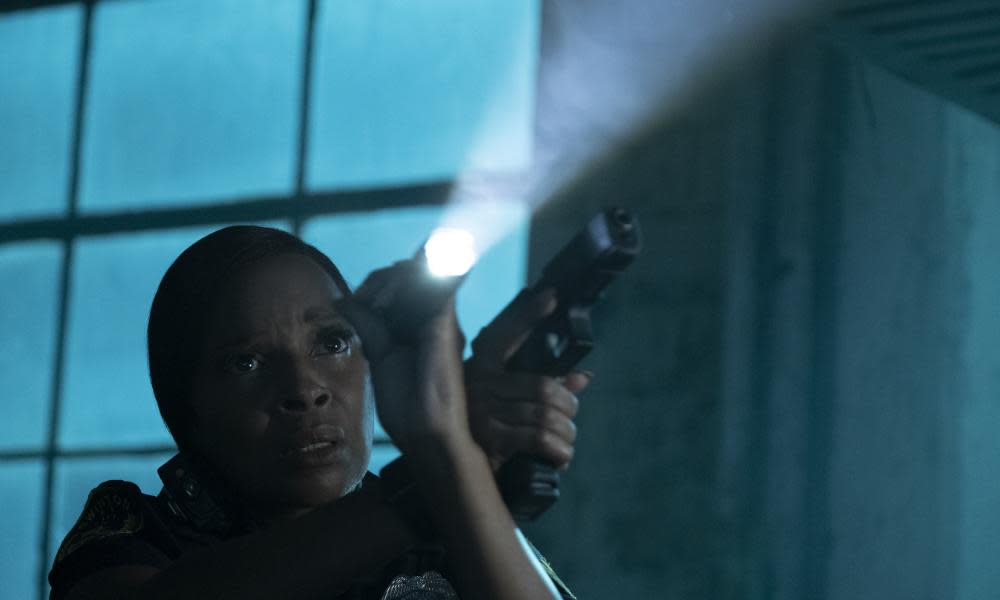Body Cam review – Mary J Blige cop horror is halfway haunting

In last October’s well-intentioned yet hackneyed action drama Black and Blue, Naomie Harris played a cop caught between allegiance to the force and to the community as she uncovered wrongdoing via her body cam. Cut to seven months later and we’re in eerily similar territory with the unceremoniously dumped Body Cam, a buzzy Paramount project that’s been given a hushed digital launch instead, a response to the ongoing closure of cinemas but also perhaps the underwhelming box office of the aforementioned. While it’s far from the firestarter it could have been, there’s more to this than its release would suggest, an angry, slickly directed thriller that still manages to generate enough of a spark.
Related: The Lovebirds review – wacky Netflix murder-mystery romance
While there are clear commonalities between the two (black female lead, ripped-from-the-headlines subject matter, impoverished setting, uncomfortable racial tension), Body Cam takes the elements of a cop drama and implants them into a horror film, a brave gambit that halfway works, nobly trying something fresh by mashing together two genres that can feel rather stale. At times the film’s two sides loudly clash, leaping from hokey to hard-boiled with unease, but in its finer moments, when director Malik Vitthal really finds his groove, there’s a sense of dread that binds both genres, reminding us that a shadowy supernatural villain can be just as frightening as a reckless cop with a gun.
LAPD officer Renee (Mary J Blige) is headed back on the streets after losing her temper with a civilian who questioned the legitimacy of her blackness, a fuzzily explained altercation that took place not long after her young son died in a drowning accident. While we as viewers wait for Hollywood to come up with a tragic backstory for female characters that doesn’t involve the death of a child, Renee finds herself embroiled in a confounding puzzle involving the grisly murders of cops she works with, each recorded in part via cameras.
While other reviews, and bizarrely even the film’s Wikipedia logline, have revealed the specificities of the mystery at the centre of Body Cam, I’m inclined to be less obvious because while not exactly a twist, it’s partly the not knowing that propels the plot, Richmond Riedel and Nicholas McCarthy’s script prioritising the details of Renee’s investigation over a parade of endless jump shocks. Where we’re led roots Body Cam in reality, with a devastatingly familiar crime that starkly offsets what starts out as a film in danger of veering into #BlueLivesMatter territory. Like Black and Blue, Body Cam exists in a broken America we know all too well, and there’s a pulsing rage felt throughout, established in an opening scene that has locals watch in dismay as another police officer evades conviction after killing an unarmed man of colour. The ghoulish force that haunts the community is a tangible manifestation of this anger and there’s catharsis in how it strikes back.
There are some effective scare sequences, the best of which comes near the start as Renee and her rookie partner (played by Death Note’s Nat Wolff) look for clues in a creepy rundown house, with Vitthal maintaining a confident control over his pacing, achieving at least one deviously well-orchestrated jolt, but focusing more on a sustained atmosphere. Vitthal’s accomplished direction is the film’s inarguable ace while, sadly, his lead Blige is merely competent in comparison. She underplays, which at times works given her steely profession, but at other moments, it’s a misjudged tactic, especially as she witnesses supernatural happenings on tape, a subdued expression barely registering the otherworldly horror in front of her. It’s not exactly a bad performance but one wonders what a more skilled actor could have brought to the role, one more adept at balancing the extremities of the film, juggling an emotional backstory as well as dealing with the wilder, more fantastical elements.
There’s an ambitious attempt here to create the sort of mythology that could kickstart a franchise, an unlikely proposition given Body Cam’s muted release. It’s also sadly not the sharp, scary and socially aware genre mash-up it could have been given the ingredients, but watching Vitthal aim high and not quite make it is still preferable to watching so many other horror film-makers remain satisfied with lazy regurgitation. It’s a failed gamble, but a gamble nonetheless.
Body Cam is now available to rent digitally in the US and UK

